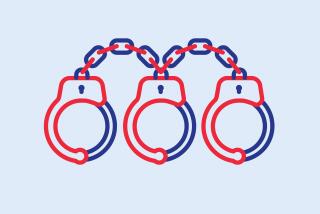Porposition 115 : It’s Casting a Net Over Juries : No: Wouldn’t you want to interview the people who will decide your case?
- Share via
A provision of Proposition 115 would mandate that the court--rather than the attorneys for the parties--interview prospective jurors. The politicians and prosecutors who back this proposition want us to think that choosing a jury only has to do with criminals. They don’t want us to think that juries are meant to protect us from government error, or worse.
Proposition 115 comes from prosecutors. They want to change the rules to make it easier for them to win. It’s easy for politicians and prosecutors to play on our fears. Crime is real and horrible. We want the robbers and the killers caught and punished. We want to feel safe on our streets and in our homes.
Most prosecutors are decent, dedicated and caring. We should never forget, though, that the worst crimes come from the state: government unchecked and out of control.
The worst crimes do not come from the street criminals. We do not have to look to Eastern Europe, Iraq, South Africa or Tian An Men Square to see the horror of unchecked government power. In our own country, the government, not street criminals, brought us slavery and then segregation. The government, not street criminals, put American citizens of Japanese ancestry in concentration camps. The government, not street criminals, deports Central American refugees to die at the hands of guerrillas and government-sponsored death squads. The American Revolution was a rebellion against government tyranny: white Anglo-Saxon Protestants against a distant power; “strange” religious sects such as Quakers, Congregationalists and Methodists against a state religion. Today, it is not only Catholics, Baptists and Jews who need to fear when prejudice is married to government. When the government goes after “them,” it might be going after us.
The English developed juries to protect commoners from prosecutions by the church and the agents of the king. Juries, to this day, protect the little guy. They are part of a justice system that looks to everyday citizens to protect one another, because however good our government, we cannot trust it to protect us from its own excesses. The jury system is not designed to protect the criminals. It is meant to protect the innocent from the government and the prosecutors who make a mistake, or worse, become evil and corrupt.
Jury selection--lawyers call it voir dire --is critical to preserving our right to an unbiased jury. A juror must bring his or her common sense and experience to difficult and important decisions. At the same time, the juror must be able to put aside the biases and prejudices that we carry with us. Jurors decide who goes to jail; who helps the victims of disabling injuries, and how; who cheated on taxes and who is the victim of the heavy hand of the Internal Revenue Service. Some jurors must decide who will live and who will die. It is only natural that before we give someone such an important job, we ask him or her some questions.
If you needed someone for an important job, wouldn’t you want to interview the person yourself? Would you want someone who didn’t have to live with the decision ask the questions? What if your ability to support your family depended on who you hired? What if your freedom depended on it? What if you were mistakenly accused of murder?
The jury selection question is simple. Prosecutors want you to vote for Proposition 115, because they don’t want you (or your lawyer) to interview the men and women who may sit on your jury. The only way they will win is to fool you. They have to make you think you are voting about someone else’s jury, some criminal’s jury. That “someone else” might be your friend, your neighbor, your relative or someone at work. Remember that the accused “criminal” might be innocent. This could happen to you.
More to Read
Sign up for Essential California
The most important California stories and recommendations in your inbox every morning.
You may occasionally receive promotional content from the Los Angeles Times.













